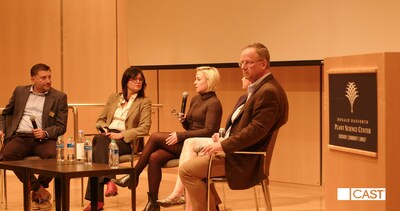On Wednesday, March 20, the Council for Agricultural Science and Technology (CAST) hosted a successful rollout event for its latest issue paper, "Applications, Benefits, and Challenges of Genome Edited Crops," at the Donald Danforth Plant Science Center in St. Louis, MO. The event attracted a diverse audience interested in the future of agriculture and the potential of genome editing technologies. A webinar discussing the publication is scheduled for April 3.
AMES, Iowa, March 28, 2024 /PRNewswire-PRWeb/ -- On Wednesday, March 20, the Council for Agricultural Science and Technology (CAST) hosted a successful rollout event for its latest issue paper, "Applications, Benefits, and Challenges of Genome Edited Crops," at the Donald Danforth Plant Science Center in St. Louis, MO. The event attracted a diverse audience interested in the future of agriculture and the potential of genome editing technologies. A webinar discussing the publication is scheduled for April 3, 11 AM to noon CST.
The paper, chaired by Sarah Evenega (Okanagan Specialty Fruit, Cornell University and the 2021 Borlaug CAST Communication Award (BCCA) recipient, provides a comprehensive overview of gene editing in agriculture, discussing its potential impact on producers, consumers, and the environment. It reviews recent advances in genome editing tools, discusses select applications in various crops, and considers the benefits and challenges of the technology. The paper also recommends ensuring that genome editing in agriculture benefits society.
Sarah Evanega remarked, "This CAST paper on genome editing comes at an important time. It's been over a decade since the potential applications of CRISPR editing systems were described. Since that time, the tools have evolved, and the global regulatory environment is rapidly catching up. Diverse stakeholders appreciate the potential of genome editing tools to innovate to meet sustainability goals, and the first products are now coming through the commercialization pipeline."
David Bubeck, Research Director at Corteva Agriscience, added, "The subject of genome editing is at an important crossroads in application. For producers and consumers worldwide to benefit from this genomic technology, global alignment on the regulatory treatment of the technology will be critical."
The event also featured a panel discussion with industry experts, including David Bubeck from Corteva Agriscience, Bernadette Juarez from the USDA-APHIS, Jennifer Rowland from the USDA, and Jack Cornell from the United Soybean Board. David Ertl from the Iowa Corn Growers Association moderated the panel.
"We are thrilled with the turnout and engagement at the paper rollout event," said CAST's CEO, Chris Boomsma. The discussions around genome editing in agriculture were insightful and thought-provoking. This technology can potentially change the industry and address significant challenges in agriculture.
Webinar Release
CAST will promote a webinar release of the paper on Wednesday, April 3, from 11 AM to 12 PM CST.
Sarah Evanega (Okanagan Specialty Fruit, Cornell University) and David Ertl (Iowa Corn Growers Association) will share their insights into genome editing technologies in agriculture and their potential impact on producers, consumers, and the environment.
This webinar aims to provide valuable knowledge about the current status and prospects of genome editing tools and the regulatory challenges and opportunities they present.
.
About the Authors
Chair
Sarah Evenega, Okanagan Specialty Fruit, Cornell University - 2021 BCCA Recipient
Authors
Zack Brown, North Carolina State University
Jose Falck-Zapeda, International Food Policy Research Institute
Melinda Yerka, University of Nevada- Reno
Leena Tripathi, International Institute of Tropical Agriculture
Nicholas Karavolias, Cold Spring Harbor Laboratory
Dave Bubeck, Corteva Agriscience
Fan-Li Chou, American Seed Trade Association
Nat Graham, Pairwise
CAST Liaison
David Ertl, Iowa Corn Growers Association
About CAST
The Council for Agricultural Science and Technology (CAST) is a nonprofit organization that gathers, interprets, and communicates credible, balanced, science-based information to policymakers, the media, the private sector, and the public. CAST is recognized as a leading source of information on agricultural science and technology.
For more information about CAST and their work, please visit .
Media Contact
Carlos Back Vianna, Council for Agricultural Science and Technology, 1 515 292 2125, [email protected],
SOURCE Council for Agricultural Science and Technology



Share this article